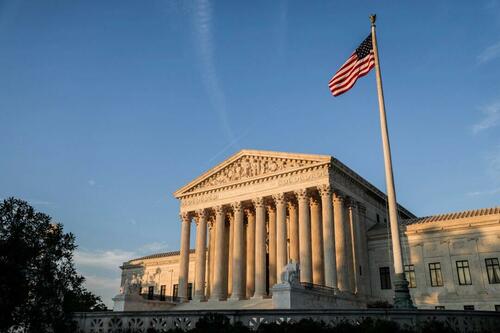Authored by Caden Pearson via The Epoch Times (emphasis ours),
The Department of Justice (DOJ) filed an emergency application on July 22 asking the Supreme Court to allow some parts of the changes the federal government made to Title IX rules related to sex discrimination, which were blocked by a lower court.

The DOJ is arguing that the wholesale pause to the rule changes was “more burdensome” than necessary, asking the Supreme Court to limit the district court’s injunction to 10 states and to only those changes related to gender identity.
In the emergency application, U.S. Solicitor General Elizabeth Prelogar argued that the more than two dozen states challenging the expansion of Title IX rules focused their objections on three provisions related to “gender identity,” leaving the vast majority of the Department of Education’s (DOE’s) expanded rules alone.
In April, the DOE issued guidance changing the scope of Title IX rules for educational institutions that receive federal funds. Title IX rules, which prohibit sex discrimination in schools, were expanded to include sexual orientation and “gender identity.”
The rule changes would mean that male students who identify as female could use women’s restrooms and spaces and join women-only organizations.
It would also expand the definition of “harassment” to include using a pronoun that aligns with sex at birth but conflicts with chosen gender identity. Schools that receive federal funding but refuse to comply risk losing that funding and facing lawsuits.
The expansion of the rules also included changes to recordkeeping requirements, grievance procedures, and protections for pregnant and postpartum students and employees. However, the changes at the heart of the lawsuits filed by Republican-led states and other groups related to the three provisions on gender identity.
On June 17, a federal district court in Kentucky blocked the new regulations in several Republican-led states while lawsuits were ongoing.
On July 22, Ms. Prelogar asked the Supreme Court to narrow the district court’s injunction to the 10 states where the rule bans discrimination based on “gender identity”: Idaho, Indiana, Kentucky, Louisiana, Mississippi, Montana, Ohio, Tennessee, Virginia, and West Virginia.
“The district court held that respondents’ challenges are likely to succeed and issued a preliminary injunction. But the court refused to tailor the injunction to the two provisions of the Rule that are the source of respondents’ asserted injuries—or even to the three provisions they have challenged on the merits,” Ms. Prelogar wrote.
“Instead, the court enjoined the entire Rule, including dozens of provisions that respondents had not challenged and that the court did not purport to find likely invalid.”
The solicitor general has asked the Supreme Court for a partial stay of the district court’s order that would allow the unchallenged portions of the Title IX rule changes, such as provisions related to new mothers, to be implemented while the legal challenges play out.
The emergency application comes days after the Sixth U.S. Circuit Court of Appeals upheld the district court’s preliminary injunction.
Federal district court judges had ruled in favor of the states in three cases, blocking the rule from being implemented in 15 states and at schools attended by the children of members of two conservative groups: Moms for Liberty and Young America’s Foundation.
However, the regulation is still expected to go into effect in the remaining states by Aug. 1.
The rule change came after President Joe Biden issued an executive order on March 8, 2021, formally tasking the DOE with amending Title IX to include “discrimination on the basis of sexual orientation and gender identity.”